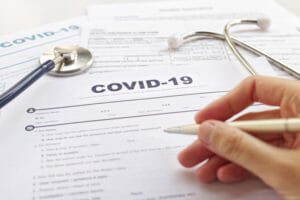Borrowing from experience
Hurricane Katrina and the COVID-19 pandemic. Different in many ways – local versus worldwide. Similar in many ways, including the flow of funds from the United States government and the unique challenges of accounting for the new forms of cash inflows and the emerging demand for cash outflows.
Under the Coronavirus Aid, Relief, and Economic Security (CARES) Act, Congress has earmarked $100 billion of emergency relief to providers. The first $30 billion of these grant funds are being released to providers based on their Medicare revenue in accordance with the Center for Medicare and Medicaid (CMS) guidance. For transparency and trackability, providers receiving these grants should establish a unique general ledger account, with inclusion within Patient Service Revenue on the provider’s statement of operations.
The CARES Act also allows providers to apply for cash inflow through the Accelerated Advance Payment Program. Funds are anticipated being received a week after the application. There are four items that must be met in order to apply which are included on CMS’ website. In contrast to the grant funds mentioned above, the advanced funding should be recognized as a deferral of revenue that will be offset as funds are recouped through future revenue claims, with CMS setting a prescribed timeframe for those recoupments.
On the flip side, it is widely acknowledged that providers have had extraordinary cash outflows in reaction to the COVID-19 pandemic. Recalling the experience from Katrina, the ultimate settling with the Federal Emergency Management Agency (FEMA) was quite burdensome for many organizations. Attention is naturally given to reacting to the crisis and tackling it head on without an awareness of the accounting of such costs in real time.
To relieve back-end pressure of building documentation of costs incurred, we recommend that healthcare organizations:
- Create a separate Cost Center for COVID-19 related costs.
- Add separate general ledger accounts to capture all non-payroll costs related to COVID-19.
- Create time studies to document the full-time equivalents on staff during the period of reacting to the pandemic.
- Document additional payroll costs such as shift differential and overtime pay incurred.
- Document how you determined what supplier you purchased from when purchasing supplies outside of your Group Purchasing Organization. Retain bids from various providers, or any evidential matter to support the reasonableness of the price paid for those supplies.
- Track the value of supplies contributed.
It is expected that providers will have to support that the grant funds received were used only for coronavirus related costs and not for expenses reimbursed from some other source. The latest documentation indicates that providers receiving over $150,000 in grant funds will file quarterly reports on how the funds were spent.
Plan now to track both the funds in and funds out, again real time to allow for quick and accurate accounting of your transactions through this crisis.
Check back for further insights as CMS begins distributing the remainder of the CARES Act grant funding.
If you have any questions, please contact a member of the LaPorte Healthcare Industry Group.

